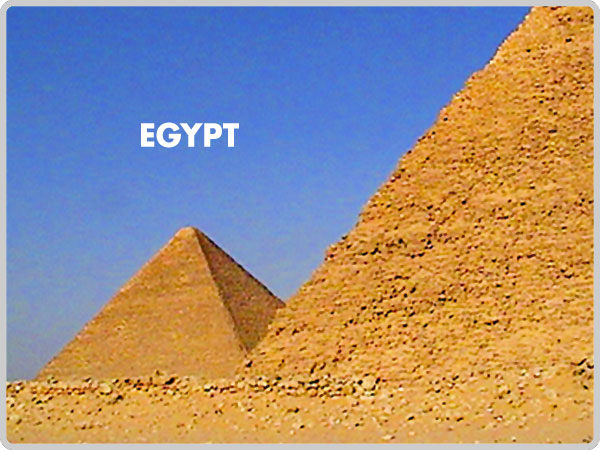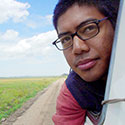
ENTRIES FROM THE GLOBAL TRIP BLOG CHRONICLES
An American in Cairo
From the trip blog: "The Global Trip 2004: Sixteen Months Around The World"
Posted June 04, 2004
DAY 227: Cairo, Egypt is known around the world for its ancient historical past. The ancient Egypt civilization was one of the greatest in the world, attracting millions of visitors around the world to see its pyramids, hieroglyphics and other ancient artifacts. However for me, having been away from the conveniences of American modern life for quite some time, I was looking forward to Cairo’s fast food, movie theaters and other things that I took for granted back home in metro New York City.
All this would have to wait, as getting passed Egyptian immigration proved to be my toughest border crossing yet.
Then and Now
From the trip blog: "The Global Trip 2004: Sixteen Months Around The World"
Posted June 04, 2004
DAY 228: Unless you’ve been comatose for most of your life, you already know that one of the greatest civilizations of ancient history was the Egyptian one. You know of the pharaohs and the mummies and the pyramids and the hieroglyphics, which comedian Billy Crystal once theorized where just “a comic strip about a guy named Sphinxy.” However, it’s one thing to read about all these things in a school history book, it’s another to be there in Egypt and see the old artifacts of ancient society juxtaposed to the modern one.
Taken For A Ride
From the trip blog: "The Global Trip 2004: Sixteen Months Around The World"
Posted June 05, 2004
DAY 229: Blogreader and former “The Trinidad Show” cast member (Ecuador) Navid was in good spirits on Yahoo! Messenger when I logged onto my daily morning internet session to upload Blog entries. Having been to Egypt before, he gave me suggestions on what I should see in my limited 12-day stint in the country of the former ancient civilization: Luxor, Aswan, Dahab and other historical sites. It was good guidance for when I would leave Cairo and explore Egypt on my own.
It was Friday, the holy day in Muslim culture, and most of Cairo was shut down. In and around Tahrir Square, the usual traffic jams were replaced with almost empty streets. I figured if one place would be open, it’d be the places of tourism draw, and no where in Cairo is that draw bigger than the Pyramids of Giza, not too far away across the River Nile.
Dates in Egypt
From the trip blog: "The Global Trip 2004: Sixteen Months Around The World"
Posted June 12, 2004
DAY 230: For some reason, a feeling of shame fills me whenever I cave in and sign up for a guided tour. I feel like I’m “cheating” the Blogreader from stories of independent (mis)adventures, or defying the unspoken backpacker code or something. For some reason, this scolding voice inside my head manifests itself in the voice of opinionated Lara (“The Trinidad Show” recurring cast member, Peru, Bolivia, Brazil), who always brought up the distinction of the “traveler” and the “package holiday tourist.”
A Student in Babylon
From the trip blog: "The Global Trip 2004: Sixteen Months Around The World"
Posted June 12, 2004
DAY 231: I surrendered my passport to the security guard like I did the day before. It sufficed for the lack of a student ID card for entrance within the American University of Cairo’s campus, just off of downtown’s Tahrir Square. No I wasn’t posing as a student (yet); I just wanted access to their American bookstore. Fed up with Lonely Planet’s Shoestring Guide to Africa, I bought Let’s Go’s Middle East guidebook so I could further investigate my options for a 2-3 jaunt through Jordan after my Egyptian tour. Lonely Planet’s Shoestring Guide, trying to pack too much in one sitting, rushed and skipping a lot of things.
My Nubian Rights
From the trip blog: "The Global Trip 2004: Sixteen Months Around The World"
Posted June 14, 2004
DAY 232: Nubia, the ancient civilization which bridged the Egyptians with the Africans, lies in the region between Luxor, Egypt and Khartoum, Sudan. While most of the ancient sites of Nubia were lost to earthquakes or flooding, several still remain. The starting point for seeing the remains of the Nubian empire is the city of Aswan, Egypt’s southern most city, populated by the dark-skinned descendants of the former civilization.
Rush and Relaxation
From the trip blog: "The Global Trip 2004: Sixteen Months Around The World"
Posted June 14, 2004
DAY 233: “So are we just waiting for the sun to come up?” I asked minibus driver Yohannes in the darkness of 4 a.m. I, along with every tourist in Aswan that hadn’t gone already, was up by 3:30 in the morning to ride the 300 km. to the Temple of Abu Simbel.
“Sun?” he asked in confusion.
“Why are we waiting then?” Our minivan was just one vehicle in a long line of minivans, minibuses and coach buses lined up in the morning darkness waiting for I didn’t know what until Yohannes answered:
“For the police convoy to take us.”
The Special Felucca
From the trip blog: "The Global Trip 2004: Sixteen Months Around The World"
Posted June 14, 2004
DAY 234: “Are your parents retarded?” Cheryl said, telling us the first half of a pick-up line her friend used back home. “Because you’re special.” Little did we know when she said that, that being “special” was what probably the conception of our little felucca group that day.
Follow That Shawl!
From the trip blog: "The Global Trip 2004: Sixteen Months Around The World"
Posted June 14, 2004
DAY 235: Like the mummies of ancient Egypt, seven backpackers lay in polyester and nylon sarcophagi until the sun god Ra woke them up. No, it wasn’t the afterlife; it was breakfast time.
Valley Boy
From the trip blog: "The Global Trip 2004: Sixteen Months Around The World"
Posted June 14, 2004
DAY 236: While modern Egyptian civilization seems to be occupied with one thing — making a living by any means necessary — ancient Egyptian civilization seemed to be obsessed with only one thing: death. With strong beliefs in the afterlife — and the preparation thereof — citizens of all classes prepared for life after the living. Pharaohs were no stranger to this custom; in fact, they were the masters of preparing for the afterlife with all their goods, and no where in Egypt was this more concentrated than in Ancient Thebes, on the west bank of Luxor.
My New Paradise
From the trip blog: "The Global Trip 2004: Sixteen Months Around The World"
Posted June 17, 2004
DAY 237: Tourism in Egypt falls into two main categories: 1) sightseeing the ancient sites and 2) relaxing down the shore of the Red Sea. Of all the Egyptian shore communities of the Red Sea, nowhere is the scene more laid back than in Dahab, on the eastern side of the Sinai Peninsula. Away from the “package holiday” scene of the bigger cities, Dahab has retained a hippy vibe with an Arabian flavor so relaxed that Lonely Planet states that many travelers to Egypt skip the ancient stuff and head right for the shore.
Moses For A Day
From the trip blog: "The Global Trip 2004: Sixteen Months Around The World"
Posted June 17, 2004
DAY 238: “Uh, there’s a camel behind you,” I told Michelle in the darkness of 2 a.m. It sounded like the beginning of a practical joke, but lo and behold, fellow hiker Michelle turned around and saw a massive moonlit camel right behind her. She flinched back in surprise. Apparently, camels are quiet walkers in the desert sands and can really sneak up on you.
My Three Dives
From the trip blog: "The Global Trip 2004: Sixteen Months Around The World"
Posted June 17, 2004
DAY 239: Dahab was once an oasis for the hippies of the 1960s, where bohemian travelers sat on cushions and sucked up the haze of marijuana through the pipe of a hookah. But as Let’s Go states, “Now, Tommy Hilfiger is more popular than tie-dye and cell phones more prominent than the joints… More than any other factor, the diving industry has driven the changes in Dahab.” Nowadays, travelers come to Dahab to suck the oxygen from a tube out of an air tank.
Last Day In Paradise
From the trip blog: "The Global Trip 2004: Sixteen Months Around The World"
Posted June 17, 2004
DAY 240: It was only about 7:45 in the morning when I was out of bed and back in the comforts of the pillow lounge on the beach of Penguin Village. Reason (other than the fact that pillow lounges rule): I had to finish all my written homework for my Advanced Open Water diver certification course to turn in later that day. Apparently my classmate and dive buddy Oz had the same idea because he was out and at the pillow cafe by eight to do the same. I had finished most of my homework by the time Oz arrived — it was fairly easy; the homework was open book, and the book was written at a fifth-grade reading level — and so I did the courteous American high school thing by letting him copy.
Into The Arabian West
From the trip blog: "The Global Trip 2004: Sixteen Months Around The World"
Posted June 18, 2004
DAY 241: “Where are you from?” the nameless taxi driver asked me from the driver’s seat. I was in the back row, behind my carpool companion Rosa.
“New York,” I replied.
“Ah, New York?” the jovial portly man said. “My brother lives in New York!” He told me that he had planned to visit his brother in the Big Apple, but when he applied for a visa at the American embassy in Cairo, he was rejected. The embassy said he didn’t have enough bank documents to show that he could financially support himself there — even though he claimed he did. The taxi driver thought there was a different reason.
“I have three thousand dollars American, but I think they reject me when they saw my name,” he said. “My name is Osama.”
Talk about having the wrong name at the wrong time.
Jewish Mother, American Dad
From the trip blog: "The Global Trip: Holla! In The Holy Land"
Posted June 24, 2009
DAYS 7-8: “It’s amazing, isn’t it?” said a middle-aged South African tourist admiring the scenery as we waited under the shade at a bus stop rest area midway between Jerusalem and Eilat. “It’s amazing that they built all this in such a short period of time. How did they do it? It’s amazing.”
I stated the obvious. “Well, foreign support.”
But he was on a rant. “How can they do all this, and not believe in the Messiah? That’s the amazing thing…”
Oy yoy yoy. Here we go, I thought. Another preachy Christian South African fanatic. I hadn’t encountered one since that South African Creationist I shared a room and boat tour with, ironically in the Galapagos, birthplace of Darwin’s Theory of Evolution.
He continued, “That they can still be blessed by His grace and build all this in a short period of time…”
Fortunately we were on different buses to Eilat, and we had already started to reboard.
 When he’s not making a living as an
When he’s not making a living as an 